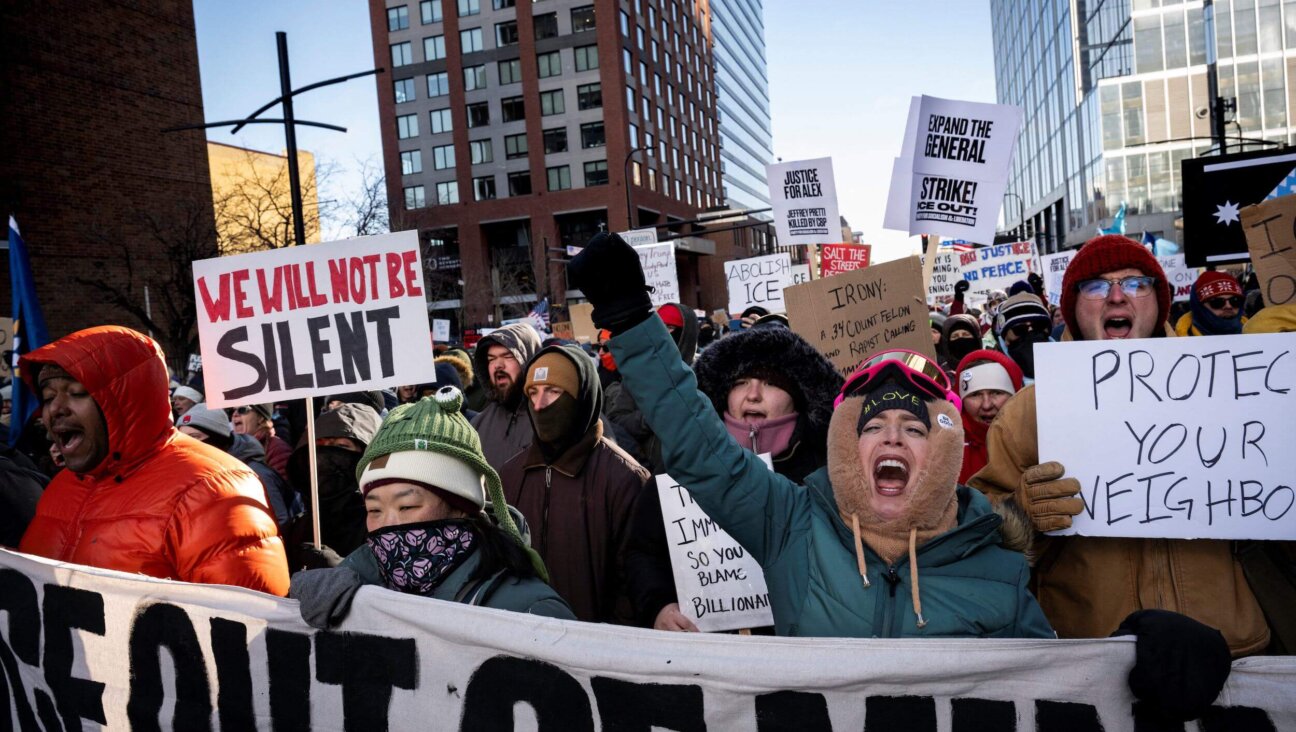Faced With Steve Bannon, Jewish Groups Need To Reach Out to Decent Republicans

Steve Bannon does a radio broadcast Image by Getty
As Donald Trump takes his first steps toward staffing his administration, he’s confronting us with yet another conundrum: What to do when the leader of the world’s greatest democracy makes Steve Bannon his designated chief strategist?
Bannon, the man who took over the right-wing provocateur website Breitbart News and turned it into the central bulletin board of America’s radical right, will have direct access to the Oval Office, where he can plant his ideas of so-called white nationalism and rank racism, and his tolerance of anti-Semitism and proto-fascism. Yes, he’ll theoretically be balanced by the coequal status of designated White House chief of staff Reince Priebus, a mainstream conservative. But the very choice of Bannon for such a senior role shows a sympathetic tilt toward his radicalism. Bomb-throwing extremism has been elevated to equal rank with sanity.
What, then, are we to do? That’s very unclear. As an initial step, thousands of citizens have been taking to the streets to protest the direction the voters have chosen. That’s a conventional method of venting anger, but it won’t change things for the better. The culture of protest rallies essentially belongs to the left. Conservatives tend to be alienated by street actions, not won over.
Make no mistake: It’s mainstream conservatives who must be won over if change is to be achieved. They’re in the driver’s seat. Come January they will control all three branches of government. If there’s to be any prospect of reining in or reversing the proto-fascist leanings of Bannon and his master, it must come from the Republican-ruled Congress or the soon-to-be Republican ruled Supreme Court. Thus far the Republicans have shown at every turn that when forced to choose, they favor party advantage over national interest. If that can be overcome, it will be not by battering but by sweet-talking or horse-trading.
The organized Jewish community has a role to play in this effort vis-à-vis the Republicans — if it chooses to play it. Despite its tiny size, the Jewish community for decades wielded considerable influence in Washington and the broader public square. Once upon a time, in the 1950s and ’60s, the major Jewish organizations took an activist stance in fighting for social justice, for civil rights, immigration reform, economic fairness and more.
But that’s unlikely to be replicated anytime soon. Today, with the notable exception of Reform Judaism and the perennially feisty Anti-Defamation League, the main organizations tend to hide behind their not-for-profit status and avoid challenging Washington, unless they’re prodded by Israel. Our community has largely abdicated its erstwhile role as a moral force to be reckoned with on the national stage.
How that came about is no secret. The major Jewish advocacy organizations first gained clout in Washington through their leading role in the post-World War II battles against discrimination: civil rights, immigration quota reform and church-state separation. All of those were based on self-interest, as all successful political struggles are. Before the war, Jews and blacks faced routine, pervasive discrimination in jobs, schools and housing. After the war, Jews and blacks organized to outlaw discrimination on the basis of race or religion.
That battle was won, at least for Jews, with the passage of the 1964 and 1965 civil rights laws. Almost immediately, the newly triumphant organizations turned their attention to Israel. Domestic social justice became an afterthought. Tilting against government or public conservatism on divisive issues, as they’d done in the 1950s, no longer served urgent Jewish needs. The new liberal agenda — abortion rights, gay and lesbian rights, economic justice — was still widely favored on the Jewish street, but it no longer involved specifically Jewish interests. What’s more, fighting with the White House or Congress over such nonessential issues was thought to weaken access on the life-and-death issue of defending Israel.
There was another change: the explosive post-1967 growth of the Jewish community bureaucracy, from advocacy to education and beyond. Funding it vastly boosted the clout — and veto power — of big donors. Donors’ threats to withhold million-dollar gifts in protest of an agency’s stance on labor rights or tax cuts became routine. The agencies learned to behave.
All that is history. With a few exceptions, it’s been decades since Jewish communal clout was wielded seriously on behalf of the domestic issues that most Jews care most about. As for defending the rights and interests of American Jews — as Jews — it lost urgency and became a fading memory.
Until November 2016. Suddenly, the rights and safety of American Jews are a matter of urgency, because enemies of American Jews are once again on the march — not as noisy demonstrators on campus, but as administration officials. Suddenly we need our major representative organizations to represent us and our needs. What’s not clear is whether they remember how, and whether their donors will let them.
We don’t know what a Trump-Bannon administration will bring. But if Bannon even slightly lives up to his reputation, we may see efforts to chip away at minority rights, religious or otherwise, at tax exemptions for not-for-profit social service agencies, care for the elderly, the freedom to lobby and advocate for Jews around the world or simply to speak and publish on matters of conscience. If that happens, our Jewish advocacy agencies should be ready with plans for responding and pushing back.
Working alliances should be in place with traditional liberal partners, with allies on both sides of Congress and among the Jewish agencies themselves — not simply to speak out for righteousness, but to make deals for mutual benefit. Coalitions within the Jewish community should be broad and inclusive, as they were back in the days when our community was a force to be reckoned with. Most important, leaders and activists must relearn something once obvious but now long forgotten: The purpose of political work is not to express our feelings, but to get a job done.
Contact J.J. Goldberg at [email protected] and follow him on Twitter, @JJ_Goldberg

















